Influence of Organisational Politics, Power, and Culture on Individual and Team Performance
VerifiedAdded on 2023/01/04
|16
|5316
|41
AI Summary
This study explores the impact of organisational politics, power, and culture on individual and team performance. It discusses the role of culture in shaping behaviour, the influence of politics on decision-making, and the power dynamics within an organisation. The study also examines the ways in which process and content theories help organisations achieve their goals, and the factors that contribute to effective team performance.
Contribute Materials
Your contribution can guide someone’s learning journey. Share your
documents today.
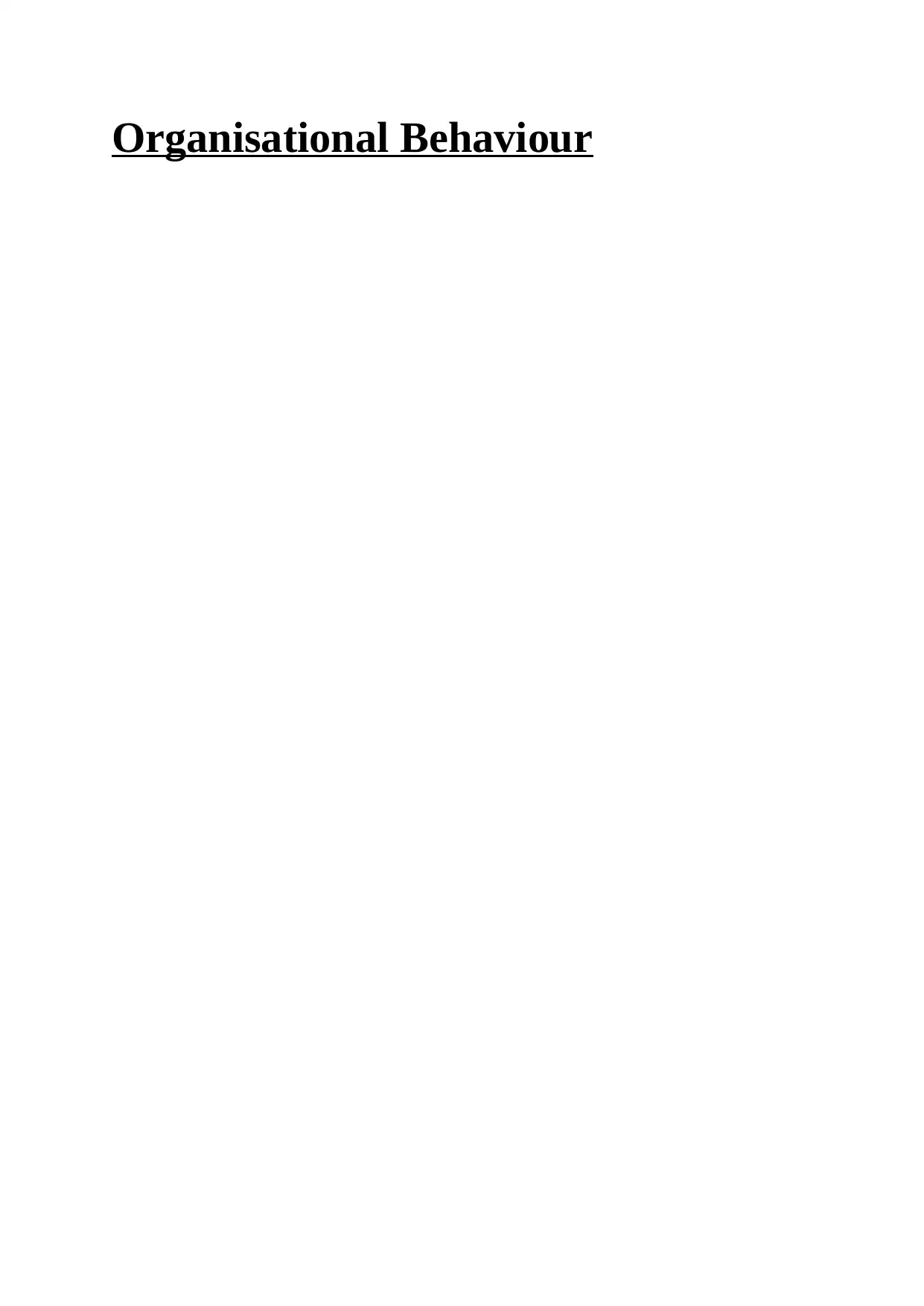
Organisational Behaviour
Secure Best Marks with AI Grader
Need help grading? Try our AI Grader for instant feedback on your assignments.
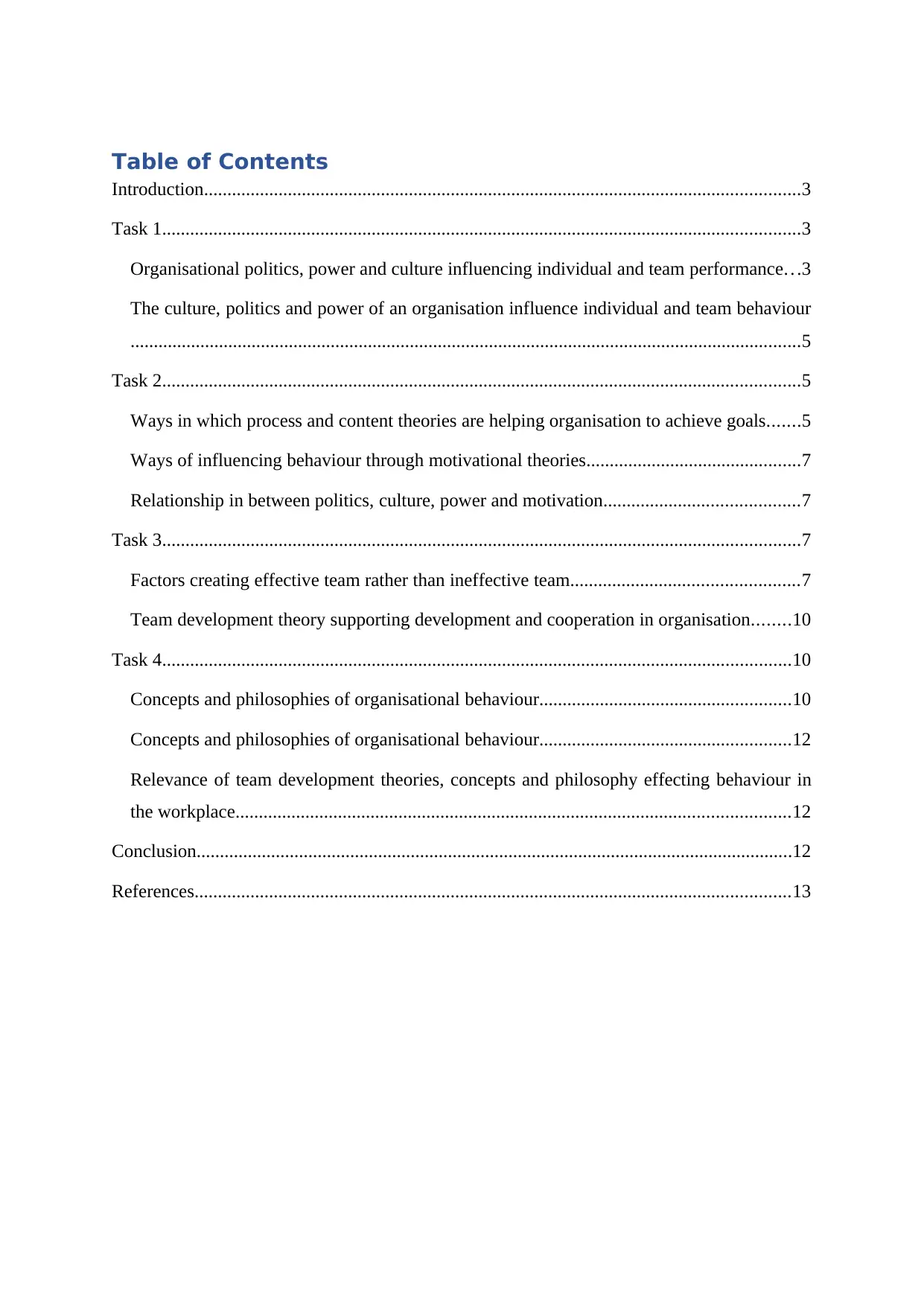
Table of Contents
Introduction................................................................................................................................3
Task 1.........................................................................................................................................3
Organisational politics, power and culture influencing individual and team performance. . .3
The culture, politics and power of an organisation influence individual and team behaviour
................................................................................................................................................5
Task 2.........................................................................................................................................5
Ways in which process and content theories are helping organisation to achieve goals.......5
Ways of influencing behaviour through motivational theories..............................................7
Relationship in between politics, culture, power and motivation..........................................7
Task 3.........................................................................................................................................7
Factors creating effective team rather than ineffective team.................................................7
Team development theory supporting development and cooperation in organisation........10
Task 4.......................................................................................................................................10
Concepts and philosophies of organisational behaviour......................................................10
Concepts and philosophies of organisational behaviour......................................................12
Relevance of team development theories, concepts and philosophy effecting behaviour in
the workplace.......................................................................................................................12
Conclusion................................................................................................................................12
References................................................................................................................................13
Introduction................................................................................................................................3
Task 1.........................................................................................................................................3
Organisational politics, power and culture influencing individual and team performance. . .3
The culture, politics and power of an organisation influence individual and team behaviour
................................................................................................................................................5
Task 2.........................................................................................................................................5
Ways in which process and content theories are helping organisation to achieve goals.......5
Ways of influencing behaviour through motivational theories..............................................7
Relationship in between politics, culture, power and motivation..........................................7
Task 3.........................................................................................................................................7
Factors creating effective team rather than ineffective team.................................................7
Team development theory supporting development and cooperation in organisation........10
Task 4.......................................................................................................................................10
Concepts and philosophies of organisational behaviour......................................................10
Concepts and philosophies of organisational behaviour......................................................12
Relevance of team development theories, concepts and philosophy effecting behaviour in
the workplace.......................................................................................................................12
Conclusion................................................................................................................................12
References................................................................................................................................13
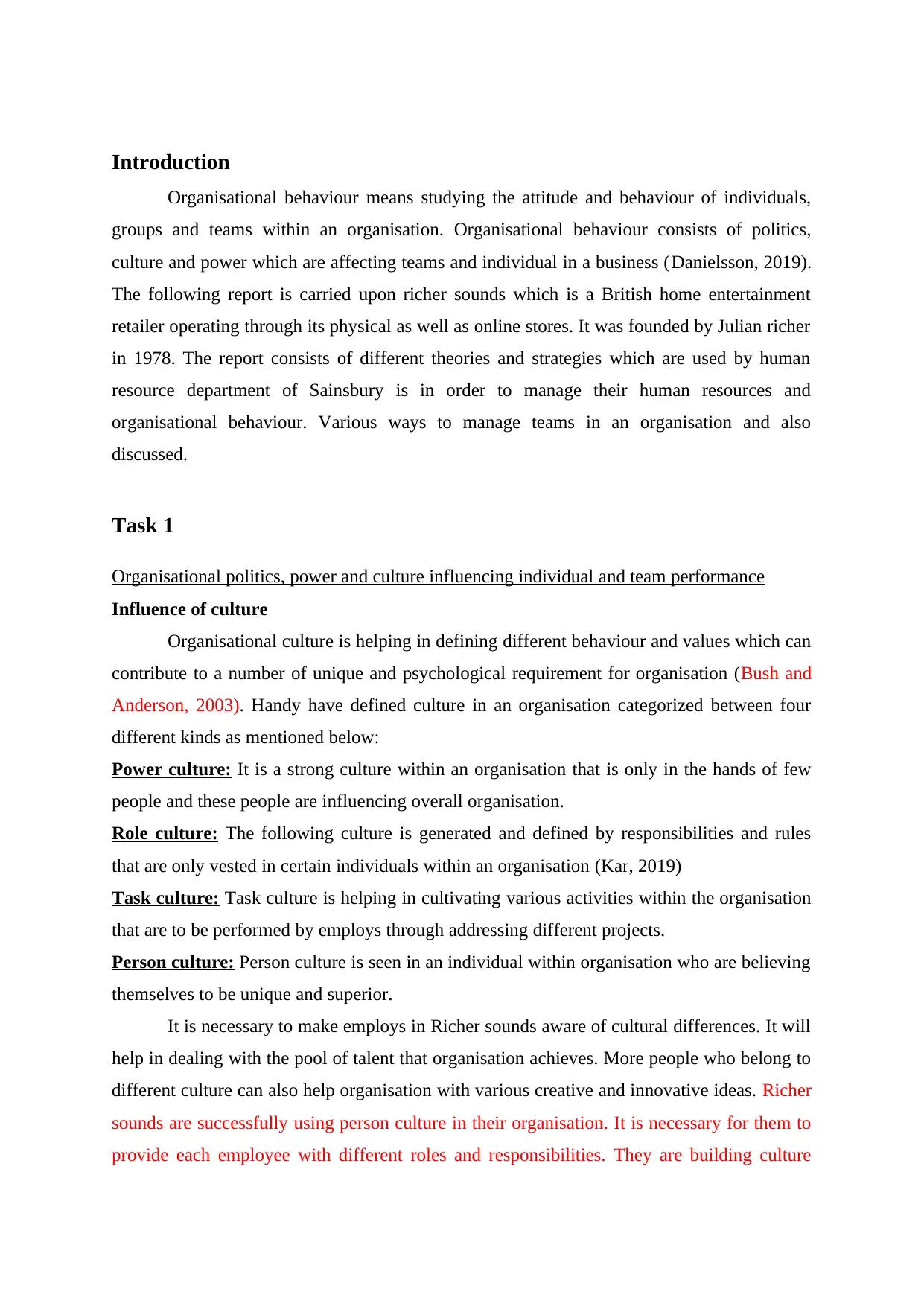
Introduction
Organisational behaviour means studying the attitude and behaviour of individuals,
groups and teams within an organisation. Organisational behaviour consists of politics,
culture and power which are affecting teams and individual in a business (Danielsson, 2019).
The following report is carried upon richer sounds which is a British home entertainment
retailer operating through its physical as well as online stores. It was founded by Julian richer
in 1978. The report consists of different theories and strategies which are used by human
resource department of Sainsbury is in order to manage their human resources and
organisational behaviour. Various ways to manage teams in an organisation and also
discussed.
Task 1
Organisational politics, power and culture influencing individual and team performance
Influence of culture
Organisational culture is helping in defining different behaviour and values which can
contribute to a number of unique and psychological requirement for organisation (Bush and
Anderson, 2003). Handy have defined culture in an organisation categorized between four
different kinds as mentioned below:
Power culture: It is a strong culture within an organisation that is only in the hands of few
people and these people are influencing overall organisation.
Role culture: The following culture is generated and defined by responsibilities and rules
that are only vested in certain individuals within an organisation (Kar, 2019)
Task culture: Task culture is helping in cultivating various activities within the organisation
that are to be performed by employs through addressing different projects.
Person culture: Person culture is seen in an individual within organisation who are believing
themselves to be unique and superior.
It is necessary to make employs in Richer sounds aware of cultural differences. It will
help in dealing with the pool of talent that organisation achieves. More people who belong to
different culture can also help organisation with various creative and innovative ideas. Richer
sounds are successfully using person culture in their organisation. It is necessary for them to
provide each employee with different roles and responsibilities. They are building culture
Organisational behaviour means studying the attitude and behaviour of individuals,
groups and teams within an organisation. Organisational behaviour consists of politics,
culture and power which are affecting teams and individual in a business (Danielsson, 2019).
The following report is carried upon richer sounds which is a British home entertainment
retailer operating through its physical as well as online stores. It was founded by Julian richer
in 1978. The report consists of different theories and strategies which are used by human
resource department of Sainsbury is in order to manage their human resources and
organisational behaviour. Various ways to manage teams in an organisation and also
discussed.
Task 1
Organisational politics, power and culture influencing individual and team performance
Influence of culture
Organisational culture is helping in defining different behaviour and values which can
contribute to a number of unique and psychological requirement for organisation (Bush and
Anderson, 2003). Handy have defined culture in an organisation categorized between four
different kinds as mentioned below:
Power culture: It is a strong culture within an organisation that is only in the hands of few
people and these people are influencing overall organisation.
Role culture: The following culture is generated and defined by responsibilities and rules
that are only vested in certain individuals within an organisation (Kar, 2019)
Task culture: Task culture is helping in cultivating various activities within the organisation
that are to be performed by employs through addressing different projects.
Person culture: Person culture is seen in an individual within organisation who are believing
themselves to be unique and superior.
It is necessary to make employs in Richer sounds aware of cultural differences. It will
help in dealing with the pool of talent that organisation achieves. More people who belong to
different culture can also help organisation with various creative and innovative ideas. Richer
sounds are successfully using person culture in their organisation. It is necessary for them to
provide each employee with different roles and responsibilities. They are building culture
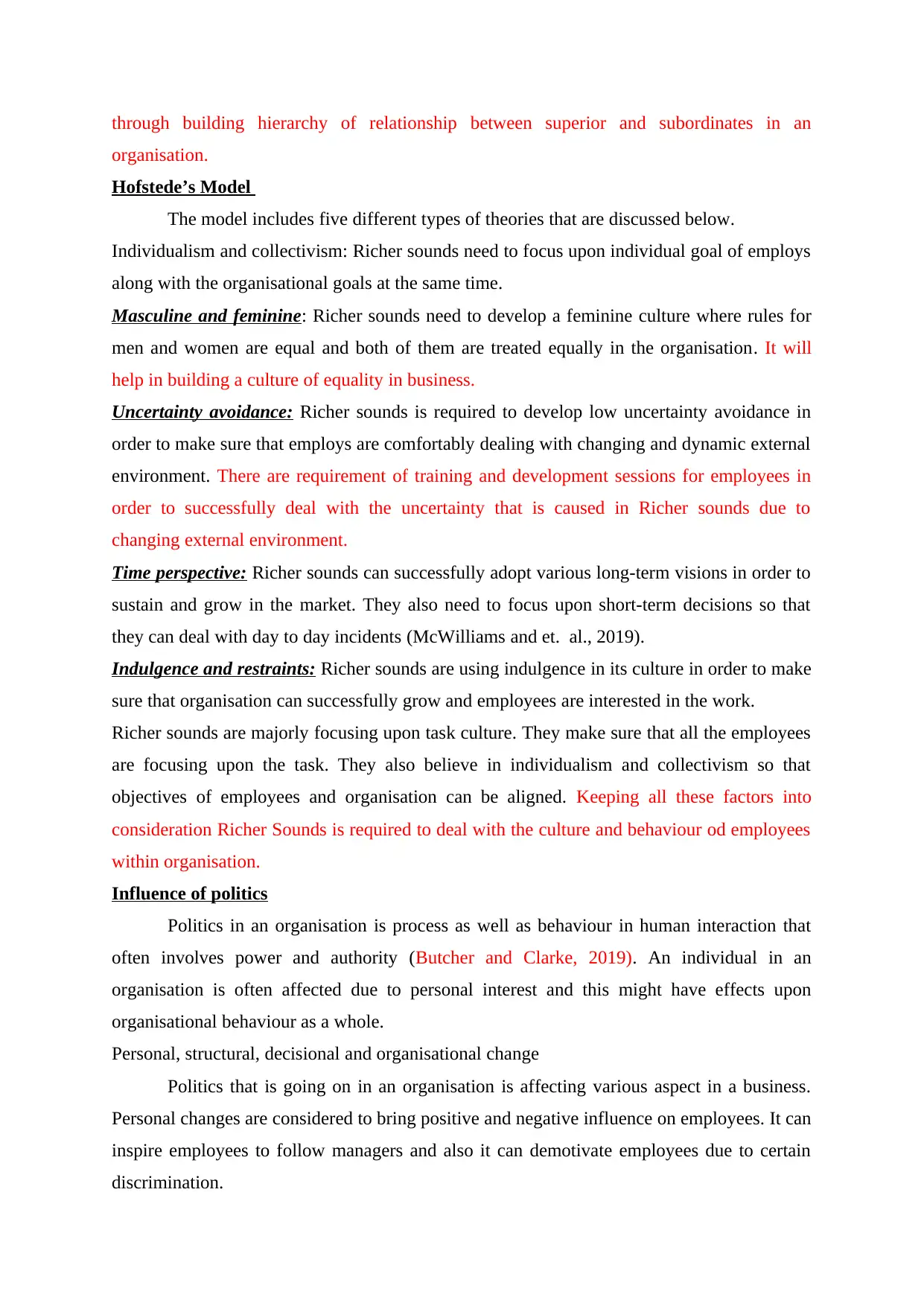
through building hierarchy of relationship between superior and subordinates in an
organisation.
Hofstede’s Model
The model includes five different types of theories that are discussed below.
Individualism and collectivism: Richer sounds need to focus upon individual goal of employs
along with the organisational goals at the same time.
Masculine and feminine: Richer sounds need to develop a feminine culture where rules for
men and women are equal and both of them are treated equally in the organisation. It will
help in building a culture of equality in business.
Uncertainty avoidance: Richer sounds is required to develop low uncertainty avoidance in
order to make sure that employs are comfortably dealing with changing and dynamic external
environment. There are requirement of training and development sessions for employees in
order to successfully deal with the uncertainty that is caused in Richer sounds due to
changing external environment.
Time perspective: Richer sounds can successfully adopt various long-term visions in order to
sustain and grow in the market. They also need to focus upon short-term decisions so that
they can deal with day to day incidents (McWilliams and et. al., 2019).
Indulgence and restraints: Richer sounds are using indulgence in its culture in order to make
sure that organisation can successfully grow and employees are interested in the work.
Richer sounds are majorly focusing upon task culture. They make sure that all the employees
are focusing upon the task. They also believe in individualism and collectivism so that
objectives of employees and organisation can be aligned. Keeping all these factors into
consideration Richer Sounds is required to deal with the culture and behaviour od employees
within organisation.
Influence of politics
Politics in an organisation is process as well as behaviour in human interaction that
often involves power and authority (Butcher and Clarke, 2019). An individual in an
organisation is often affected due to personal interest and this might have effects upon
organisational behaviour as a whole.
Personal, structural, decisional and organisational change
Politics that is going on in an organisation is affecting various aspect in a business.
Personal changes are considered to bring positive and negative influence on employees. It can
inspire employees to follow managers and also it can demotivate employees due to certain
discrimination.
organisation.
Hofstede’s Model
The model includes five different types of theories that are discussed below.
Individualism and collectivism: Richer sounds need to focus upon individual goal of employs
along with the organisational goals at the same time.
Masculine and feminine: Richer sounds need to develop a feminine culture where rules for
men and women are equal and both of them are treated equally in the organisation. It will
help in building a culture of equality in business.
Uncertainty avoidance: Richer sounds is required to develop low uncertainty avoidance in
order to make sure that employs are comfortably dealing with changing and dynamic external
environment. There are requirement of training and development sessions for employees in
order to successfully deal with the uncertainty that is caused in Richer sounds due to
changing external environment.
Time perspective: Richer sounds can successfully adopt various long-term visions in order to
sustain and grow in the market. They also need to focus upon short-term decisions so that
they can deal with day to day incidents (McWilliams and et. al., 2019).
Indulgence and restraints: Richer sounds are using indulgence in its culture in order to make
sure that organisation can successfully grow and employees are interested in the work.
Richer sounds are majorly focusing upon task culture. They make sure that all the employees
are focusing upon the task. They also believe in individualism and collectivism so that
objectives of employees and organisation can be aligned. Keeping all these factors into
consideration Richer Sounds is required to deal with the culture and behaviour od employees
within organisation.
Influence of politics
Politics in an organisation is process as well as behaviour in human interaction that
often involves power and authority (Butcher and Clarke, 2019). An individual in an
organisation is often affected due to personal interest and this might have effects upon
organisational behaviour as a whole.
Personal, structural, decisional and organisational change
Politics that is going on in an organisation is affecting various aspect in a business.
Personal changes are considered to bring positive and negative influence on employees. It can
inspire employees to follow managers and also it can demotivate employees due to certain
discrimination.
Secure Best Marks with AI Grader
Need help grading? Try our AI Grader for instant feedback on your assignments.
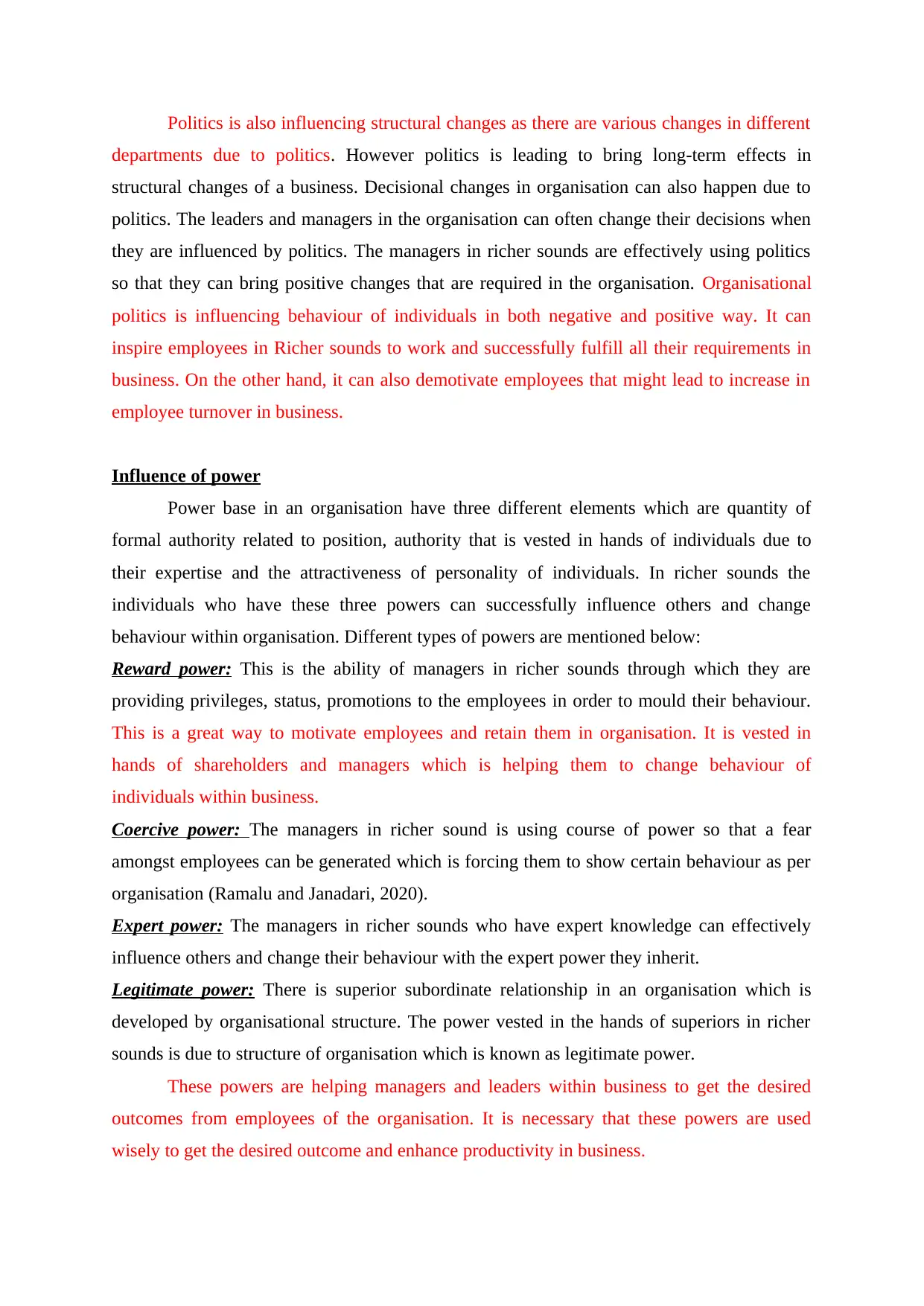
Politics is also influencing structural changes as there are various changes in different
departments due to politics. However politics is leading to bring long-term effects in
structural changes of a business. Decisional changes in organisation can also happen due to
politics. The leaders and managers in the organisation can often change their decisions when
they are influenced by politics. The managers in richer sounds are effectively using politics
so that they can bring positive changes that are required in the organisation. Organisational
politics is influencing behaviour of individuals in both negative and positive way. It can
inspire employees in Richer sounds to work and successfully fulfill all their requirements in
business. On the other hand, it can also demotivate employees that might lead to increase in
employee turnover in business.
Influence of power
Power base in an organisation have three different elements which are quantity of
formal authority related to position, authority that is vested in hands of individuals due to
their expertise and the attractiveness of personality of individuals. In richer sounds the
individuals who have these three powers can successfully influence others and change
behaviour within organisation. Different types of powers are mentioned below:
Reward power: This is the ability of managers in richer sounds through which they are
providing privileges, status, promotions to the employees in order to mould their behaviour.
This is a great way to motivate employees and retain them in organisation. It is vested in
hands of shareholders and managers which is helping them to change behaviour of
individuals within business.
Coercive power: The managers in richer sound is using course of power so that a fear
amongst employees can be generated which is forcing them to show certain behaviour as per
organisation (Ramalu and Janadari, 2020).
Expert power: The managers in richer sounds who have expert knowledge can effectively
influence others and change their behaviour with the expert power they inherit.
Legitimate power: There is superior subordinate relationship in an organisation which is
developed by organisational structure. The power vested in the hands of superiors in richer
sounds is due to structure of organisation which is known as legitimate power.
These powers are helping managers and leaders within business to get the desired
outcomes from employees of the organisation. It is necessary that these powers are used
wisely to get the desired outcome and enhance productivity in business.
departments due to politics. However politics is leading to bring long-term effects in
structural changes of a business. Decisional changes in organisation can also happen due to
politics. The leaders and managers in the organisation can often change their decisions when
they are influenced by politics. The managers in richer sounds are effectively using politics
so that they can bring positive changes that are required in the organisation. Organisational
politics is influencing behaviour of individuals in both negative and positive way. It can
inspire employees in Richer sounds to work and successfully fulfill all their requirements in
business. On the other hand, it can also demotivate employees that might lead to increase in
employee turnover in business.
Influence of power
Power base in an organisation have three different elements which are quantity of
formal authority related to position, authority that is vested in hands of individuals due to
their expertise and the attractiveness of personality of individuals. In richer sounds the
individuals who have these three powers can successfully influence others and change
behaviour within organisation. Different types of powers are mentioned below:
Reward power: This is the ability of managers in richer sounds through which they are
providing privileges, status, promotions to the employees in order to mould their behaviour.
This is a great way to motivate employees and retain them in organisation. It is vested in
hands of shareholders and managers which is helping them to change behaviour of
individuals within business.
Coercive power: The managers in richer sound is using course of power so that a fear
amongst employees can be generated which is forcing them to show certain behaviour as per
organisation (Ramalu and Janadari, 2020).
Expert power: The managers in richer sounds who have expert knowledge can effectively
influence others and change their behaviour with the expert power they inherit.
Legitimate power: There is superior subordinate relationship in an organisation which is
developed by organisational structure. The power vested in the hands of superiors in richer
sounds is due to structure of organisation which is known as legitimate power.
These powers are helping managers and leaders within business to get the desired
outcomes from employees of the organisation. It is necessary that these powers are used
wisely to get the desired outcome and enhance productivity in business.
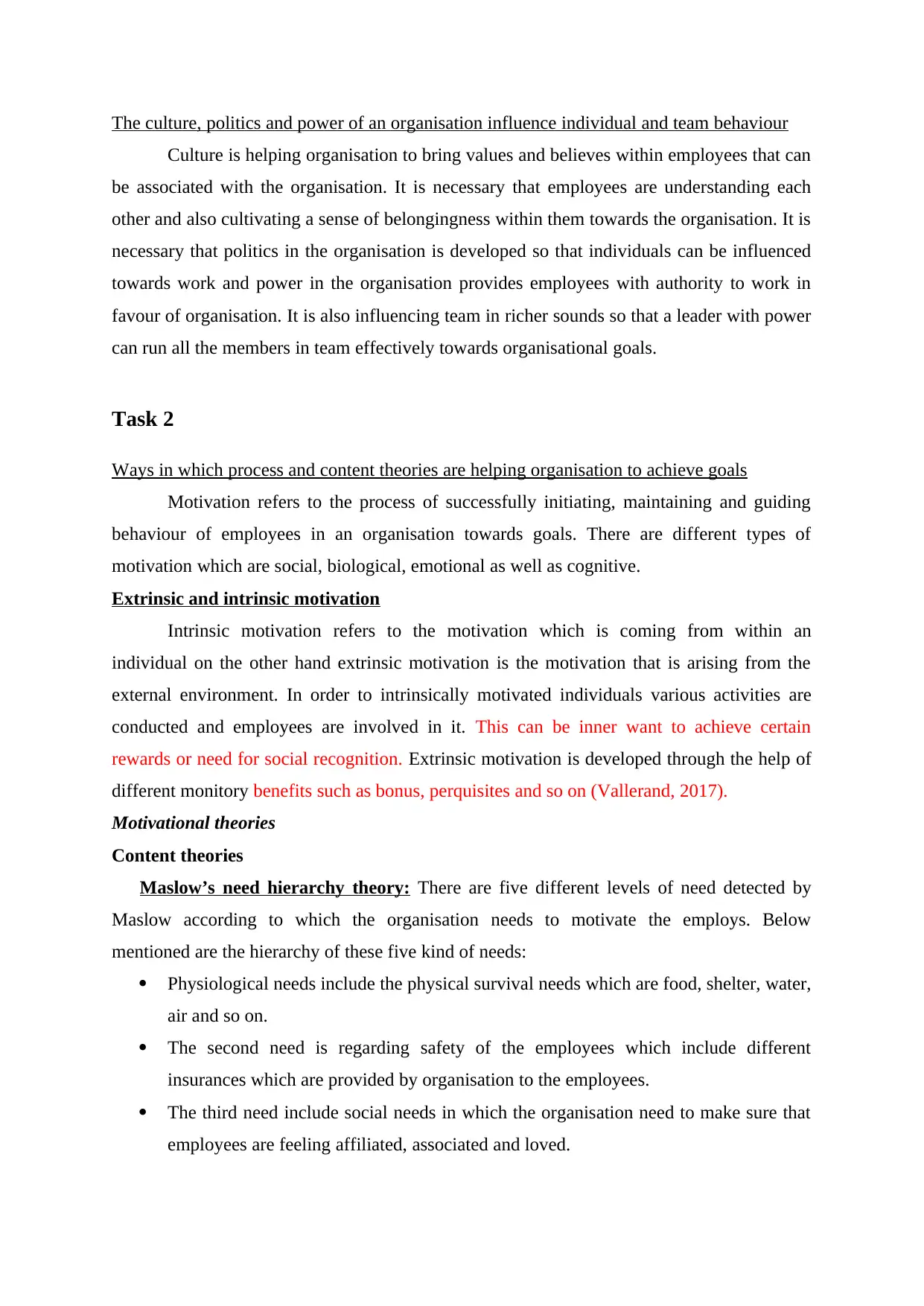
The culture, politics and power of an organisation influence individual and team behaviour
Culture is helping organisation to bring values and believes within employees that can
be associated with the organisation. It is necessary that employees are understanding each
other and also cultivating a sense of belongingness within them towards the organisation. It is
necessary that politics in the organisation is developed so that individuals can be influenced
towards work and power in the organisation provides employees with authority to work in
favour of organisation. It is also influencing team in richer sounds so that a leader with power
can run all the members in team effectively towards organisational goals.
Task 2
Ways in which process and content theories are helping organisation to achieve goals
Motivation refers to the process of successfully initiating, maintaining and guiding
behaviour of employees in an organisation towards goals. There are different types of
motivation which are social, biological, emotional as well as cognitive.
Extrinsic and intrinsic motivation
Intrinsic motivation refers to the motivation which is coming from within an
individual on the other hand extrinsic motivation is the motivation that is arising from the
external environment. In order to intrinsically motivated individuals various activities are
conducted and employees are involved in it. This can be inner want to achieve certain
rewards or need for social recognition. Extrinsic motivation is developed through the help of
different monitory benefits such as bonus, perquisites and so on (Vallerand, 2017).
Motivational theories
Content theories
Maslow’s need hierarchy theory: There are five different levels of need detected by
Maslow according to which the organisation needs to motivate the employs. Below
mentioned are the hierarchy of these five kind of needs:
Physiological needs include the physical survival needs which are food, shelter, water,
air and so on.
The second need is regarding safety of the employees which include different
insurances which are provided by organisation to the employees.
The third need include social needs in which the organisation need to make sure that
employees are feeling affiliated, associated and loved.
Culture is helping organisation to bring values and believes within employees that can
be associated with the organisation. It is necessary that employees are understanding each
other and also cultivating a sense of belongingness within them towards the organisation. It is
necessary that politics in the organisation is developed so that individuals can be influenced
towards work and power in the organisation provides employees with authority to work in
favour of organisation. It is also influencing team in richer sounds so that a leader with power
can run all the members in team effectively towards organisational goals.
Task 2
Ways in which process and content theories are helping organisation to achieve goals
Motivation refers to the process of successfully initiating, maintaining and guiding
behaviour of employees in an organisation towards goals. There are different types of
motivation which are social, biological, emotional as well as cognitive.
Extrinsic and intrinsic motivation
Intrinsic motivation refers to the motivation which is coming from within an
individual on the other hand extrinsic motivation is the motivation that is arising from the
external environment. In order to intrinsically motivated individuals various activities are
conducted and employees are involved in it. This can be inner want to achieve certain
rewards or need for social recognition. Extrinsic motivation is developed through the help of
different monitory benefits such as bonus, perquisites and so on (Vallerand, 2017).
Motivational theories
Content theories
Maslow’s need hierarchy theory: There are five different levels of need detected by
Maslow according to which the organisation needs to motivate the employs. Below
mentioned are the hierarchy of these five kind of needs:
Physiological needs include the physical survival needs which are food, shelter, water,
air and so on.
The second need is regarding safety of the employees which include different
insurances which are provided by organisation to the employees.
The third need include social needs in which the organisation need to make sure that
employees are feeling affiliated, associated and loved.
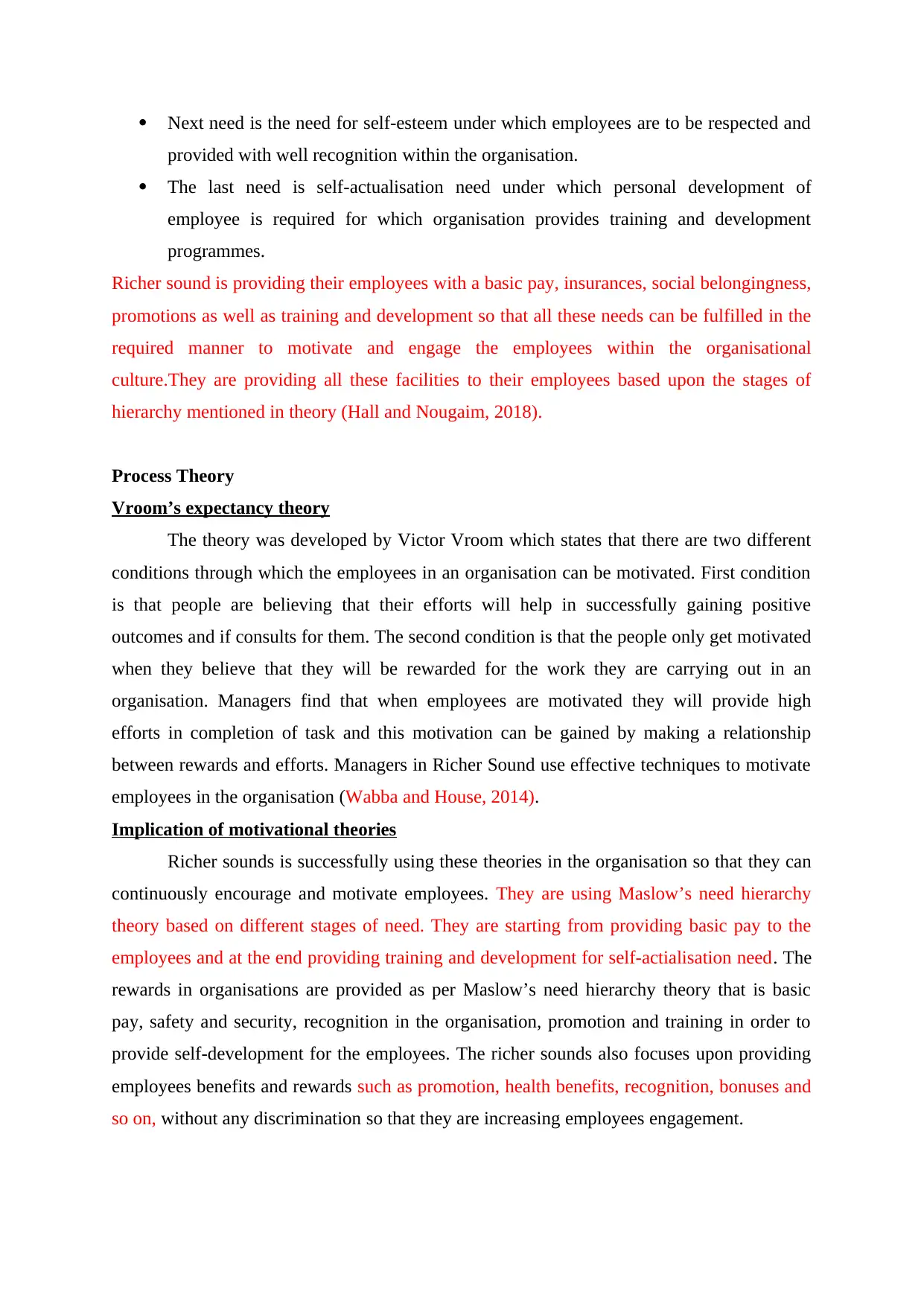
Next need is the need for self-esteem under which employees are to be respected and
provided with well recognition within the organisation.
The last need is self-actualisation need under which personal development of
employee is required for which organisation provides training and development
programmes.
Richer sound is providing their employees with a basic pay, insurances, social belongingness,
promotions as well as training and development so that all these needs can be fulfilled in the
required manner to motivate and engage the employees within the organisational
culture.They are providing all these facilities to their employees based upon the stages of
hierarchy mentioned in theory (Hall and Nougaim, 2018).
Process Theory
Vroom’s expectancy theory
The theory was developed by Victor Vroom which states that there are two different
conditions through which the employees in an organisation can be motivated. First condition
is that people are believing that their efforts will help in successfully gaining positive
outcomes and if consults for them. The second condition is that the people only get motivated
when they believe that they will be rewarded for the work they are carrying out in an
organisation. Managers find that when employees are motivated they will provide high
efforts in completion of task and this motivation can be gained by making a relationship
between rewards and efforts. Managers in Richer Sound use effective techniques to motivate
employees in the organisation (Wabba and House, 2014).
Implication of motivational theories
Richer sounds is successfully using these theories in the organisation so that they can
continuously encourage and motivate employees. They are using Maslow’s need hierarchy
theory based on different stages of need. They are starting from providing basic pay to the
employees and at the end providing training and development for self-actialisation need. The
rewards in organisations are provided as per Maslow’s need hierarchy theory that is basic
pay, safety and security, recognition in the organisation, promotion and training in order to
provide self-development for the employees. The richer sounds also focuses upon providing
employees benefits and rewards such as promotion, health benefits, recognition, bonuses and
so on, without any discrimination so that they are increasing employees engagement.
provided with well recognition within the organisation.
The last need is self-actualisation need under which personal development of
employee is required for which organisation provides training and development
programmes.
Richer sound is providing their employees with a basic pay, insurances, social belongingness,
promotions as well as training and development so that all these needs can be fulfilled in the
required manner to motivate and engage the employees within the organisational
culture.They are providing all these facilities to their employees based upon the stages of
hierarchy mentioned in theory (Hall and Nougaim, 2018).
Process Theory
Vroom’s expectancy theory
The theory was developed by Victor Vroom which states that there are two different
conditions through which the employees in an organisation can be motivated. First condition
is that people are believing that their efforts will help in successfully gaining positive
outcomes and if consults for them. The second condition is that the people only get motivated
when they believe that they will be rewarded for the work they are carrying out in an
organisation. Managers find that when employees are motivated they will provide high
efforts in completion of task and this motivation can be gained by making a relationship
between rewards and efforts. Managers in Richer Sound use effective techniques to motivate
employees in the organisation (Wabba and House, 2014).
Implication of motivational theories
Richer sounds is successfully using these theories in the organisation so that they can
continuously encourage and motivate employees. They are using Maslow’s need hierarchy
theory based on different stages of need. They are starting from providing basic pay to the
employees and at the end providing training and development for self-actialisation need. The
rewards in organisations are provided as per Maslow’s need hierarchy theory that is basic
pay, safety and security, recognition in the organisation, promotion and training in order to
provide self-development for the employees. The richer sounds also focuses upon providing
employees benefits and rewards such as promotion, health benefits, recognition, bonuses and
so on, without any discrimination so that they are increasing employees engagement.
Paraphrase This Document
Need a fresh take? Get an instant paraphrase of this document with our AI Paraphraser
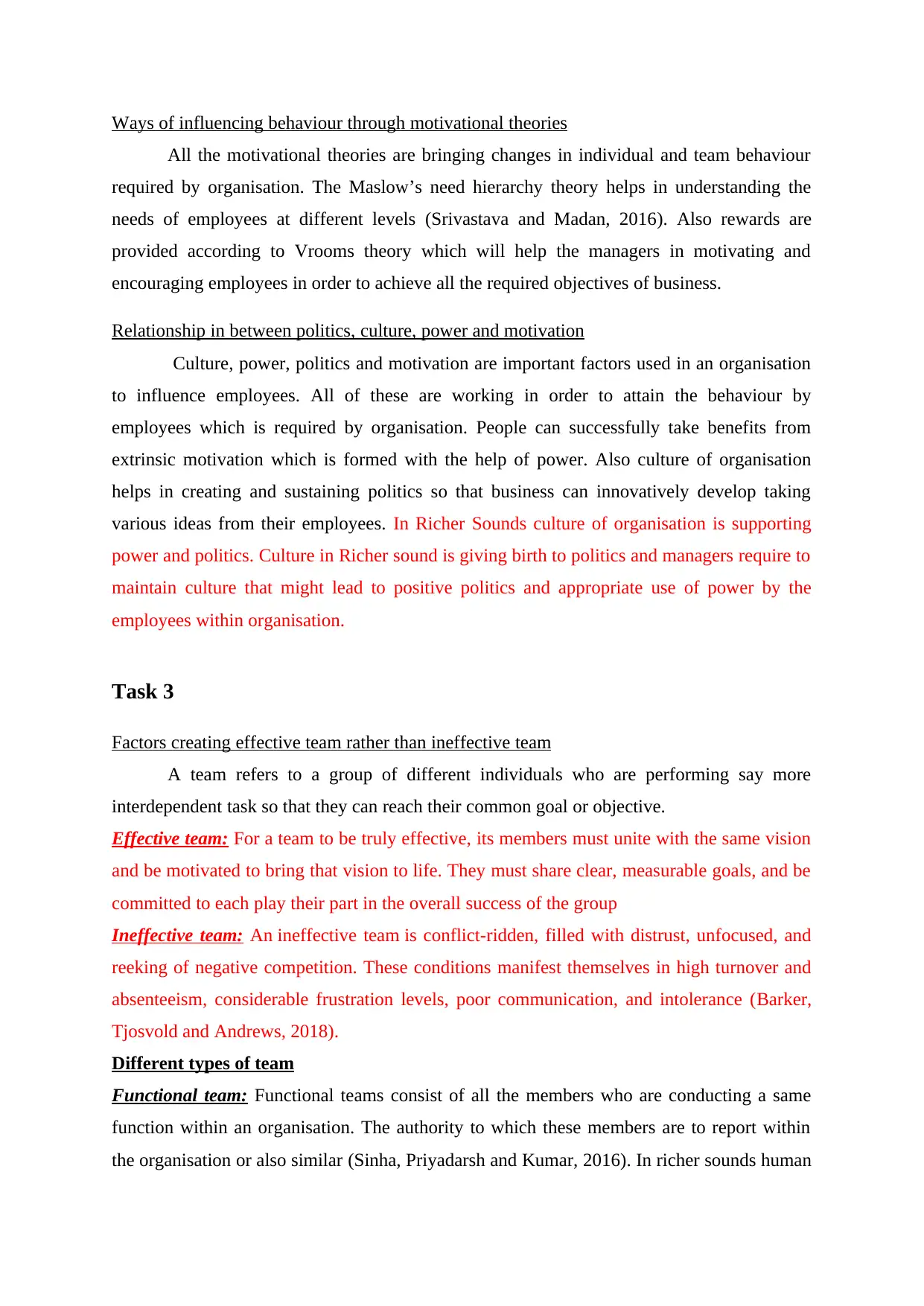
Ways of influencing behaviour through motivational theories
All the motivational theories are bringing changes in individual and team behaviour
required by organisation. The Maslow’s need hierarchy theory helps in understanding the
needs of employees at different levels (Srivastava and Madan, 2016). Also rewards are
provided according to Vrooms theory which will help the managers in motivating and
encouraging employees in order to achieve all the required objectives of business.
Relationship in between politics, culture, power and motivation
Culture, power, politics and motivation are important factors used in an organisation
to influence employees. All of these are working in order to attain the behaviour by
employees which is required by organisation. People can successfully take benefits from
extrinsic motivation which is formed with the help of power. Also culture of organisation
helps in creating and sustaining politics so that business can innovatively develop taking
various ideas from their employees. In Richer Sounds culture of organisation is supporting
power and politics. Culture in Richer sound is giving birth to politics and managers require to
maintain culture that might lead to positive politics and appropriate use of power by the
employees within organisation.
Task 3
Factors creating effective team rather than ineffective team
A team refers to a group of different individuals who are performing say more
interdependent task so that they can reach their common goal or objective.
Effective team: For a team to be truly effective, its members must unite with the same vision
and be motivated to bring that vision to life. They must share clear, measurable goals, and be
committed to each play their part in the overall success of the group
Ineffective team: An ineffective team is conflict-ridden, filled with distrust, unfocused, and
reeking of negative competition. These conditions manifest themselves in high turnover and
absenteeism, considerable frustration levels, poor communication, and intolerance (Barker,
Tjosvold and Andrews, 2018).
Different types of team
Functional team: Functional teams consist of all the members who are conducting a same
function within an organisation. The authority to which these members are to report within
the organisation or also similar (Sinha, Priyadarsh and Kumar, 2016). In richer sounds human
All the motivational theories are bringing changes in individual and team behaviour
required by organisation. The Maslow’s need hierarchy theory helps in understanding the
needs of employees at different levels (Srivastava and Madan, 2016). Also rewards are
provided according to Vrooms theory which will help the managers in motivating and
encouraging employees in order to achieve all the required objectives of business.
Relationship in between politics, culture, power and motivation
Culture, power, politics and motivation are important factors used in an organisation
to influence employees. All of these are working in order to attain the behaviour by
employees which is required by organisation. People can successfully take benefits from
extrinsic motivation which is formed with the help of power. Also culture of organisation
helps in creating and sustaining politics so that business can innovatively develop taking
various ideas from their employees. In Richer Sounds culture of organisation is supporting
power and politics. Culture in Richer sound is giving birth to politics and managers require to
maintain culture that might lead to positive politics and appropriate use of power by the
employees within organisation.
Task 3
Factors creating effective team rather than ineffective team
A team refers to a group of different individuals who are performing say more
interdependent task so that they can reach their common goal or objective.
Effective team: For a team to be truly effective, its members must unite with the same vision
and be motivated to bring that vision to life. They must share clear, measurable goals, and be
committed to each play their part in the overall success of the group
Ineffective team: An ineffective team is conflict-ridden, filled with distrust, unfocused, and
reeking of negative competition. These conditions manifest themselves in high turnover and
absenteeism, considerable frustration levels, poor communication, and intolerance (Barker,
Tjosvold and Andrews, 2018).
Different types of team
Functional team: Functional teams consist of all the members who are conducting a same
function within an organisation. The authority to which these members are to report within
the organisation or also similar (Sinha, Priyadarsh and Kumar, 2016). In richer sounds human
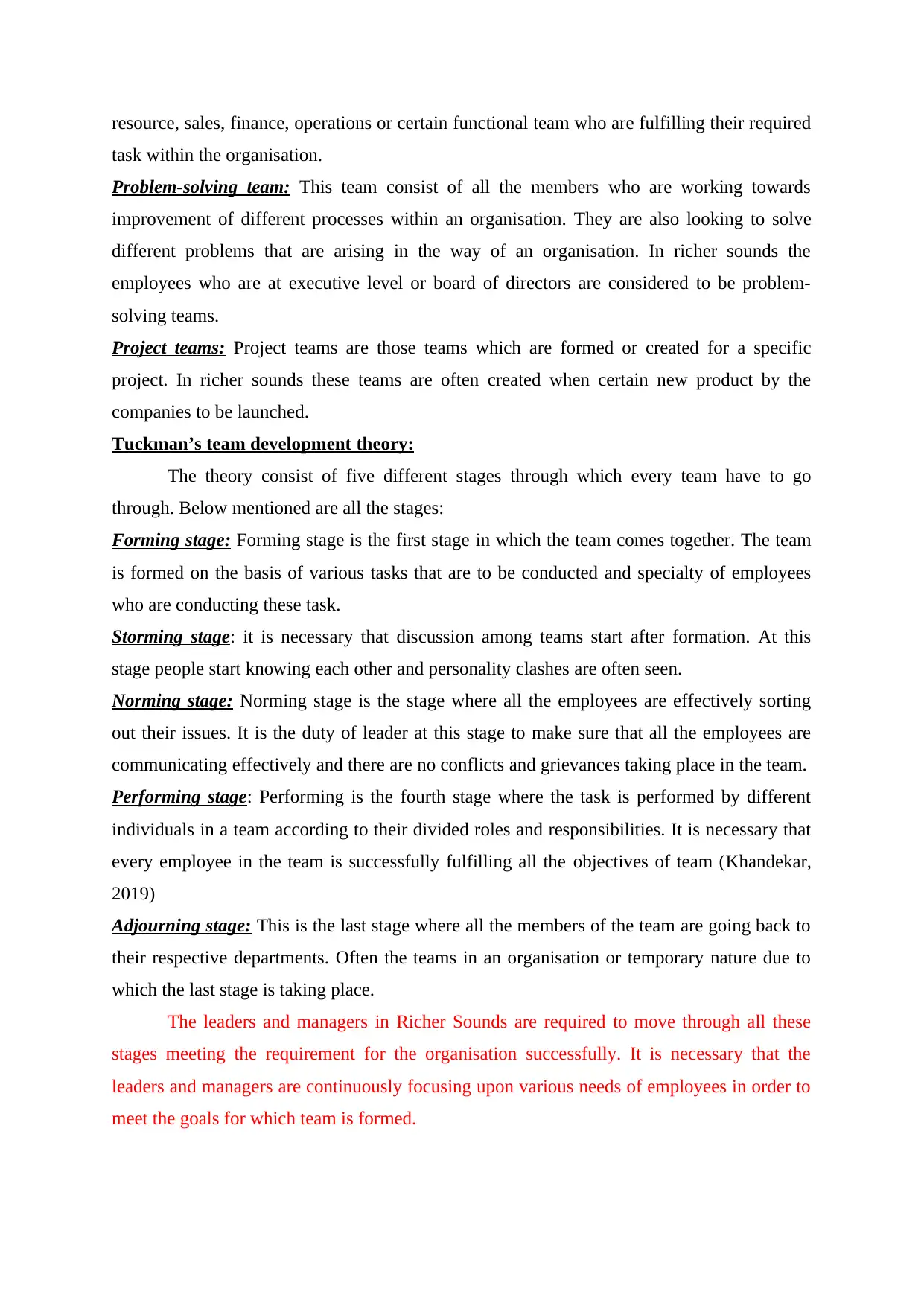
resource, sales, finance, operations or certain functional team who are fulfilling their required
task within the organisation.
Problem-solving team: This team consist of all the members who are working towards
improvement of different processes within an organisation. They are also looking to solve
different problems that are arising in the way of an organisation. In richer sounds the
employees who are at executive level or board of directors are considered to be problem-
solving teams.
Project teams: Project teams are those teams which are formed or created for a specific
project. In richer sounds these teams are often created when certain new product by the
companies to be launched.
Tuckman’s team development theory:
The theory consist of five different stages through which every team have to go
through. Below mentioned are all the stages:
Forming stage: Forming stage is the first stage in which the team comes together. The team
is formed on the basis of various tasks that are to be conducted and specialty of employees
who are conducting these task.
Storming stage: it is necessary that discussion among teams start after formation. At this
stage people start knowing each other and personality clashes are often seen.
Norming stage: Norming stage is the stage where all the employees are effectively sorting
out their issues. It is the duty of leader at this stage to make sure that all the employees are
communicating effectively and there are no conflicts and grievances taking place in the team.
Performing stage: Performing is the fourth stage where the task is performed by different
individuals in a team according to their divided roles and responsibilities. It is necessary that
every employee in the team is successfully fulfilling all the objectives of team (Khandekar,
2019)
Adjourning stage: This is the last stage where all the members of the team are going back to
their respective departments. Often the teams in an organisation or temporary nature due to
which the last stage is taking place.
The leaders and managers in Richer Sounds are required to move through all these
stages meeting the requirement for the organisation successfully. It is necessary that the
leaders and managers are continuously focusing upon various needs of employees in order to
meet the goals for which team is formed.
task within the organisation.
Problem-solving team: This team consist of all the members who are working towards
improvement of different processes within an organisation. They are also looking to solve
different problems that are arising in the way of an organisation. In richer sounds the
employees who are at executive level or board of directors are considered to be problem-
solving teams.
Project teams: Project teams are those teams which are formed or created for a specific
project. In richer sounds these teams are often created when certain new product by the
companies to be launched.
Tuckman’s team development theory:
The theory consist of five different stages through which every team have to go
through. Below mentioned are all the stages:
Forming stage: Forming stage is the first stage in which the team comes together. The team
is formed on the basis of various tasks that are to be conducted and specialty of employees
who are conducting these task.
Storming stage: it is necessary that discussion among teams start after formation. At this
stage people start knowing each other and personality clashes are often seen.
Norming stage: Norming stage is the stage where all the employees are effectively sorting
out their issues. It is the duty of leader at this stage to make sure that all the employees are
communicating effectively and there are no conflicts and grievances taking place in the team.
Performing stage: Performing is the fourth stage where the task is performed by different
individuals in a team according to their divided roles and responsibilities. It is necessary that
every employee in the team is successfully fulfilling all the objectives of team (Khandekar,
2019)
Adjourning stage: This is the last stage where all the members of the team are going back to
their respective departments. Often the teams in an organisation or temporary nature due to
which the last stage is taking place.
The leaders and managers in Richer Sounds are required to move through all these
stages meeting the requirement for the organisation successfully. It is necessary that the
leaders and managers are continuously focusing upon various needs of employees in order to
meet the goals for which team is formed.
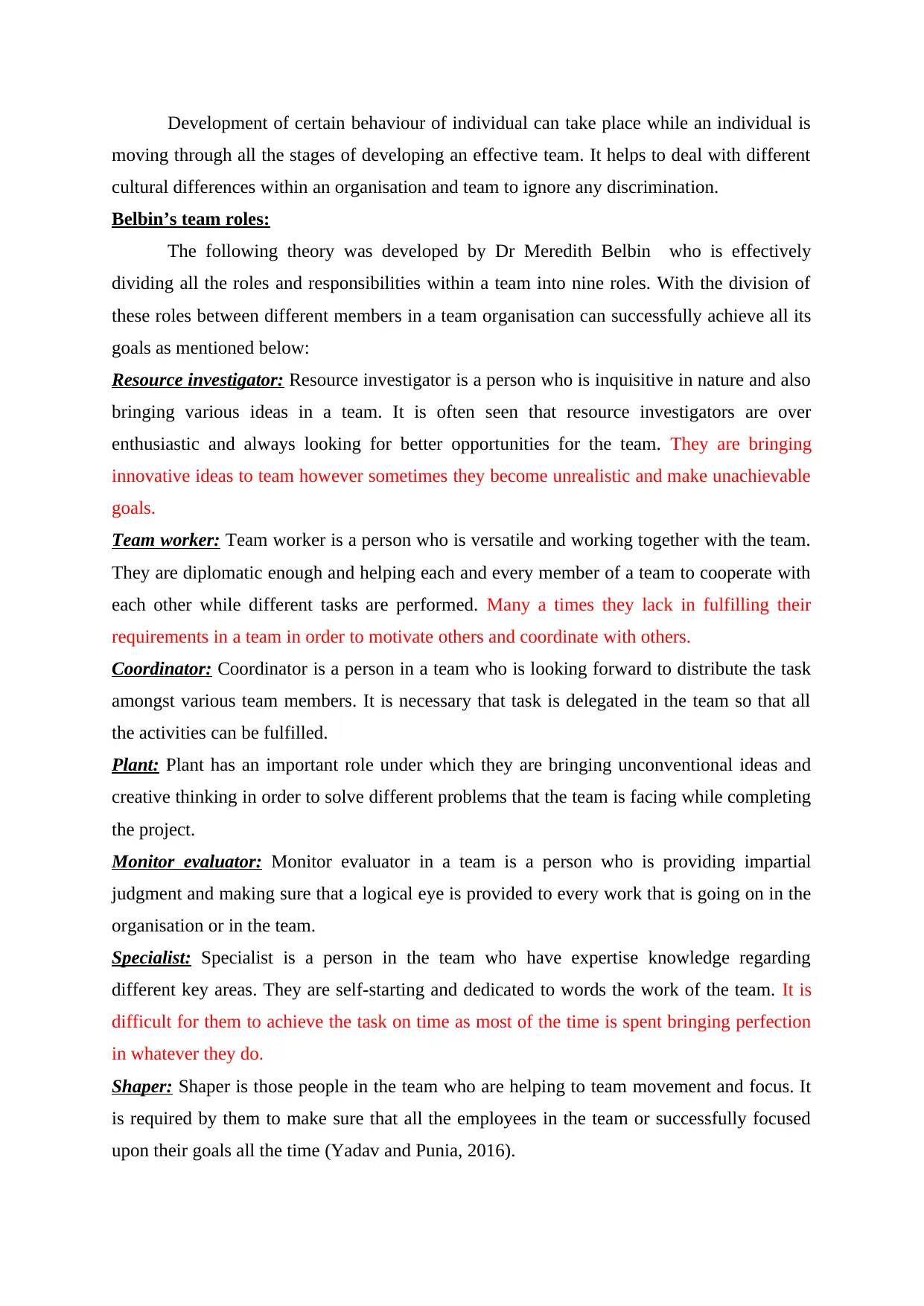
Development of certain behaviour of individual can take place while an individual is
moving through all the stages of developing an effective team. It helps to deal with different
cultural differences within an organisation and team to ignore any discrimination.
Belbin’s team roles:
The following theory was developed by Dr Meredith Belbin who is effectively
dividing all the roles and responsibilities within a team into nine roles. With the division of
these roles between different members in a team organisation can successfully achieve all its
goals as mentioned below:
Resource investigator: Resource investigator is a person who is inquisitive in nature and also
bringing various ideas in a team. It is often seen that resource investigators are over
enthusiastic and always looking for better opportunities for the team. They are bringing
innovative ideas to team however sometimes they become unrealistic and make unachievable
goals.
Team worker: Team worker is a person who is versatile and working together with the team.
They are diplomatic enough and helping each and every member of a team to cooperate with
each other while different tasks are performed. Many a times they lack in fulfilling their
requirements in a team in order to motivate others and coordinate with others.
Coordinator: Coordinator is a person in a team who is looking forward to distribute the task
amongst various team members. It is necessary that task is delegated in the team so that all
the activities can be fulfilled.
Plant: Plant has an important role under which they are bringing unconventional ideas and
creative thinking in order to solve different problems that the team is facing while completing
the project.
Monitor evaluator: Monitor evaluator in a team is a person who is providing impartial
judgment and making sure that a logical eye is provided to every work that is going on in the
organisation or in the team.
Specialist: Specialist is a person in the team who have expertise knowledge regarding
different key areas. They are self-starting and dedicated to words the work of the team. It is
difficult for them to achieve the task on time as most of the time is spent bringing perfection
in whatever they do.
Shaper: Shaper is those people in the team who are helping to team movement and focus. It
is required by them to make sure that all the employees in the team or successfully focused
upon their goals all the time (Yadav and Punia, 2016).
moving through all the stages of developing an effective team. It helps to deal with different
cultural differences within an organisation and team to ignore any discrimination.
Belbin’s team roles:
The following theory was developed by Dr Meredith Belbin who is effectively
dividing all the roles and responsibilities within a team into nine roles. With the division of
these roles between different members in a team organisation can successfully achieve all its
goals as mentioned below:
Resource investigator: Resource investigator is a person who is inquisitive in nature and also
bringing various ideas in a team. It is often seen that resource investigators are over
enthusiastic and always looking for better opportunities for the team. They are bringing
innovative ideas to team however sometimes they become unrealistic and make unachievable
goals.
Team worker: Team worker is a person who is versatile and working together with the team.
They are diplomatic enough and helping each and every member of a team to cooperate with
each other while different tasks are performed. Many a times they lack in fulfilling their
requirements in a team in order to motivate others and coordinate with others.
Coordinator: Coordinator is a person in a team who is looking forward to distribute the task
amongst various team members. It is necessary that task is delegated in the team so that all
the activities can be fulfilled.
Plant: Plant has an important role under which they are bringing unconventional ideas and
creative thinking in order to solve different problems that the team is facing while completing
the project.
Monitor evaluator: Monitor evaluator in a team is a person who is providing impartial
judgment and making sure that a logical eye is provided to every work that is going on in the
organisation or in the team.
Specialist: Specialist is a person in the team who have expertise knowledge regarding
different key areas. They are self-starting and dedicated to words the work of the team. It is
difficult for them to achieve the task on time as most of the time is spent bringing perfection
in whatever they do.
Shaper: Shaper is those people in the team who are helping to team movement and focus. It
is required by them to make sure that all the employees in the team or successfully focused
upon their goals all the time (Yadav and Punia, 2016).
Secure Best Marks with AI Grader
Need help grading? Try our AI Grader for instant feedback on your assignments.
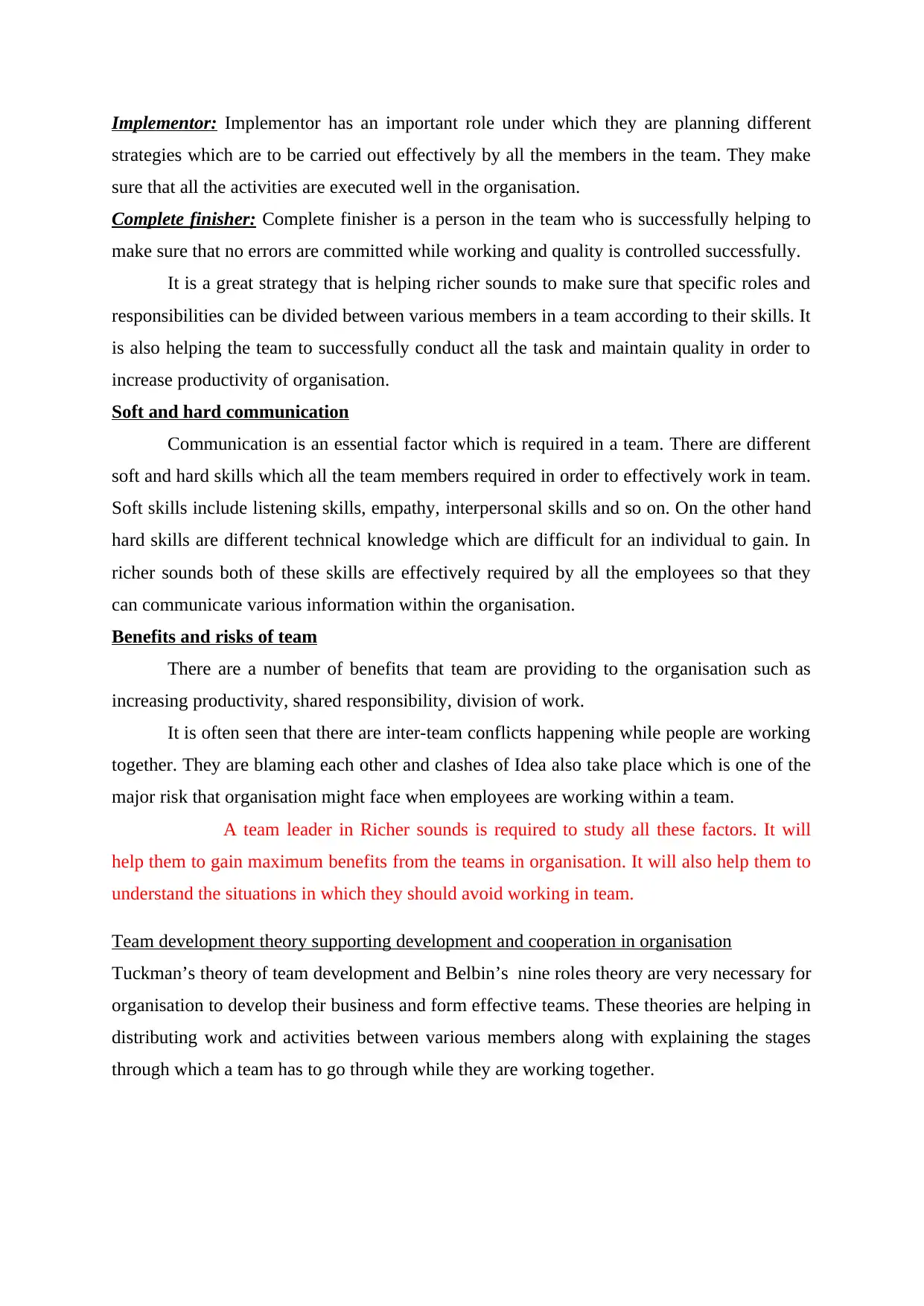
Implementor: Implementor has an important role under which they are planning different
strategies which are to be carried out effectively by all the members in the team. They make
sure that all the activities are executed well in the organisation.
Complete finisher: Complete finisher is a person in the team who is successfully helping to
make sure that no errors are committed while working and quality is controlled successfully.
It is a great strategy that is helping richer sounds to make sure that specific roles and
responsibilities can be divided between various members in a team according to their skills. It
is also helping the team to successfully conduct all the task and maintain quality in order to
increase productivity of organisation.
Soft and hard communication
Communication is an essential factor which is required in a team. There are different
soft and hard skills which all the team members required in order to effectively work in team.
Soft skills include listening skills, empathy, interpersonal skills and so on. On the other hand
hard skills are different technical knowledge which are difficult for an individual to gain. In
richer sounds both of these skills are effectively required by all the employees so that they
can communicate various information within the organisation.
Benefits and risks of team
There are a number of benefits that team are providing to the organisation such as
increasing productivity, shared responsibility, division of work.
It is often seen that there are inter-team conflicts happening while people are working
together. They are blaming each other and clashes of Idea also take place which is one of the
major risk that organisation might face when employees are working within a team.
A team leader in Richer sounds is required to study all these factors. It will
help them to gain maximum benefits from the teams in organisation. It will also help them to
understand the situations in which they should avoid working in team.
Team development theory supporting development and cooperation in organisation
Tuckman’s theory of team development and Belbin’s nine roles theory are very necessary for
organisation to develop their business and form effective teams. These theories are helping in
distributing work and activities between various members along with explaining the stages
through which a team has to go through while they are working together.
strategies which are to be carried out effectively by all the members in the team. They make
sure that all the activities are executed well in the organisation.
Complete finisher: Complete finisher is a person in the team who is successfully helping to
make sure that no errors are committed while working and quality is controlled successfully.
It is a great strategy that is helping richer sounds to make sure that specific roles and
responsibilities can be divided between various members in a team according to their skills. It
is also helping the team to successfully conduct all the task and maintain quality in order to
increase productivity of organisation.
Soft and hard communication
Communication is an essential factor which is required in a team. There are different
soft and hard skills which all the team members required in order to effectively work in team.
Soft skills include listening skills, empathy, interpersonal skills and so on. On the other hand
hard skills are different technical knowledge which are difficult for an individual to gain. In
richer sounds both of these skills are effectively required by all the employees so that they
can communicate various information within the organisation.
Benefits and risks of team
There are a number of benefits that team are providing to the organisation such as
increasing productivity, shared responsibility, division of work.
It is often seen that there are inter-team conflicts happening while people are working
together. They are blaming each other and clashes of Idea also take place which is one of the
major risk that organisation might face when employees are working within a team.
A team leader in Richer sounds is required to study all these factors. It will
help them to gain maximum benefits from the teams in organisation. It will also help them to
understand the situations in which they should avoid working in team.
Team development theory supporting development and cooperation in organisation
Tuckman’s theory of team development and Belbin’s nine roles theory are very necessary for
organisation to develop their business and form effective teams. These theories are helping in
distributing work and activities between various members along with explaining the stages
through which a team has to go through while they are working together.
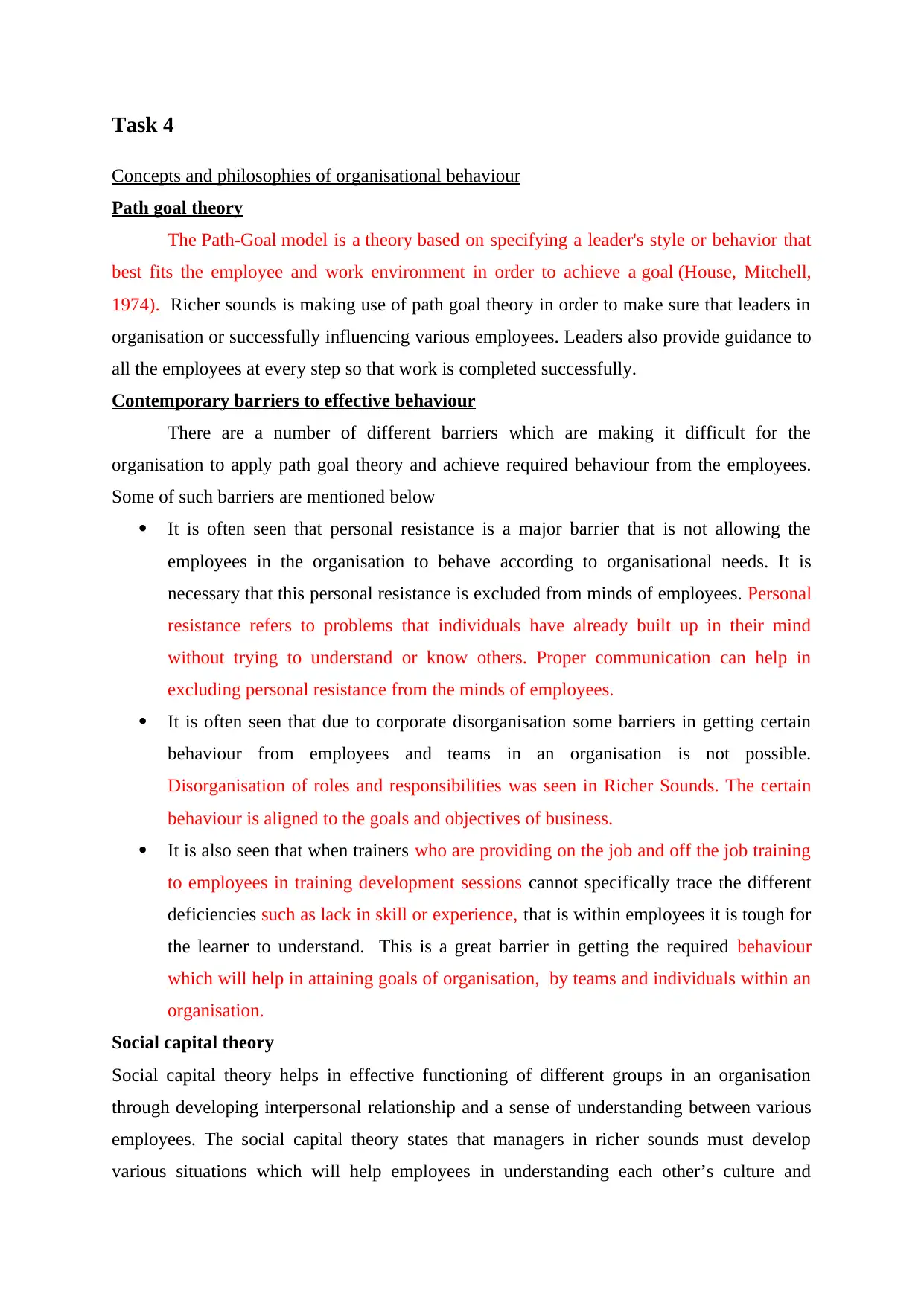
Task 4
Concepts and philosophies of organisational behaviour
Path goal theory
The Path-Goal model is a theory based on specifying a leader's style or behavior that
best fits the employee and work environment in order to achieve a goal (House, Mitchell,
1974). Richer sounds is making use of path goal theory in order to make sure that leaders in
organisation or successfully influencing various employees. Leaders also provide guidance to
all the employees at every step so that work is completed successfully.
Contemporary barriers to effective behaviour
There are a number of different barriers which are making it difficult for the
organisation to apply path goal theory and achieve required behaviour from the employees.
Some of such barriers are mentioned below
It is often seen that personal resistance is a major barrier that is not allowing the
employees in the organisation to behave according to organisational needs. It is
necessary that this personal resistance is excluded from minds of employees. Personal
resistance refers to problems that individuals have already built up in their mind
without trying to understand or know others. Proper communication can help in
excluding personal resistance from the minds of employees.
It is often seen that due to corporate disorganisation some barriers in getting certain
behaviour from employees and teams in an organisation is not possible.
Disorganisation of roles and responsibilities was seen in Richer Sounds. The certain
behaviour is aligned to the goals and objectives of business.
It is also seen that when trainers who are providing on the job and off the job training
to employees in training development sessions cannot specifically trace the different
deficiencies such as lack in skill or experience, that is within employees it is tough for
the learner to understand. This is a great barrier in getting the required behaviour
which will help in attaining goals of organisation, by teams and individuals within an
organisation.
Social capital theory
Social capital theory helps in effective functioning of different groups in an organisation
through developing interpersonal relationship and a sense of understanding between various
employees. The social capital theory states that managers in richer sounds must develop
various situations which will help employees in understanding each other’s culture and
Concepts and philosophies of organisational behaviour
Path goal theory
The Path-Goal model is a theory based on specifying a leader's style or behavior that
best fits the employee and work environment in order to achieve a goal (House, Mitchell,
1974). Richer sounds is making use of path goal theory in order to make sure that leaders in
organisation or successfully influencing various employees. Leaders also provide guidance to
all the employees at every step so that work is completed successfully.
Contemporary barriers to effective behaviour
There are a number of different barriers which are making it difficult for the
organisation to apply path goal theory and achieve required behaviour from the employees.
Some of such barriers are mentioned below
It is often seen that personal resistance is a major barrier that is not allowing the
employees in the organisation to behave according to organisational needs. It is
necessary that this personal resistance is excluded from minds of employees. Personal
resistance refers to problems that individuals have already built up in their mind
without trying to understand or know others. Proper communication can help in
excluding personal resistance from the minds of employees.
It is often seen that due to corporate disorganisation some barriers in getting certain
behaviour from employees and teams in an organisation is not possible.
Disorganisation of roles and responsibilities was seen in Richer Sounds. The certain
behaviour is aligned to the goals and objectives of business.
It is also seen that when trainers who are providing on the job and off the job training
to employees in training development sessions cannot specifically trace the different
deficiencies such as lack in skill or experience, that is within employees it is tough for
the learner to understand. This is a great barrier in getting the required behaviour
which will help in attaining goals of organisation, by teams and individuals within an
organisation.
Social capital theory
Social capital theory helps in effective functioning of different groups in an organisation
through developing interpersonal relationship and a sense of understanding between various
employees. The social capital theory states that managers in richer sounds must develop
various situations which will help employees in understanding each other’s culture and
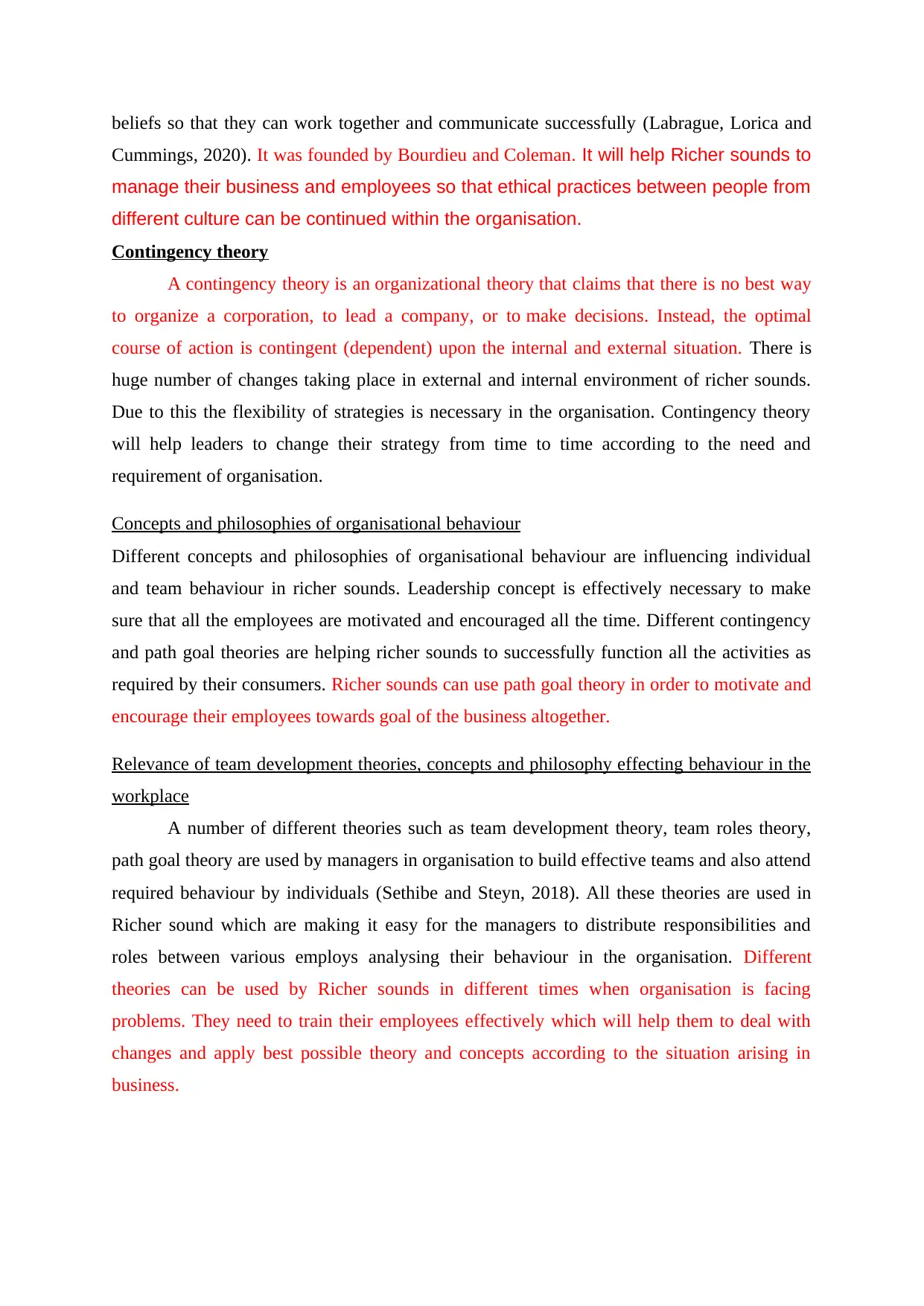
beliefs so that they can work together and communicate successfully (Labrague, Lorica and
Cummings, 2020). It was founded by Bourdieu and Coleman. It will help Richer sounds to
manage their business and employees so that ethical practices between people from
different culture can be continued within the organisation.
Contingency theory
A contingency theory is an organizational theory that claims that there is no best way
to organize a corporation, to lead a company, or to make decisions. Instead, the optimal
course of action is contingent (dependent) upon the internal and external situation. There is
huge number of changes taking place in external and internal environment of richer sounds.
Due to this the flexibility of strategies is necessary in the organisation. Contingency theory
will help leaders to change their strategy from time to time according to the need and
requirement of organisation.
Concepts and philosophies of organisational behaviour
Different concepts and philosophies of organisational behaviour are influencing individual
and team behaviour in richer sounds. Leadership concept is effectively necessary to make
sure that all the employees are motivated and encouraged all the time. Different contingency
and path goal theories are helping richer sounds to successfully function all the activities as
required by their consumers. Richer sounds can use path goal theory in order to motivate and
encourage their employees towards goal of the business altogether.
Relevance of team development theories, concepts and philosophy effecting behaviour in the
workplace
A number of different theories such as team development theory, team roles theory,
path goal theory are used by managers in organisation to build effective teams and also attend
required behaviour by individuals (Sethibe and Steyn, 2018). All these theories are used in
Richer sound which are making it easy for the managers to distribute responsibilities and
roles between various employs analysing their behaviour in the organisation. Different
theories can be used by Richer sounds in different times when organisation is facing
problems. They need to train their employees effectively which will help them to deal with
changes and apply best possible theory and concepts according to the situation arising in
business.
Cummings, 2020). It was founded by Bourdieu and Coleman. It will help Richer sounds to
manage their business and employees so that ethical practices between people from
different culture can be continued within the organisation.
Contingency theory
A contingency theory is an organizational theory that claims that there is no best way
to organize a corporation, to lead a company, or to make decisions. Instead, the optimal
course of action is contingent (dependent) upon the internal and external situation. There is
huge number of changes taking place in external and internal environment of richer sounds.
Due to this the flexibility of strategies is necessary in the organisation. Contingency theory
will help leaders to change their strategy from time to time according to the need and
requirement of organisation.
Concepts and philosophies of organisational behaviour
Different concepts and philosophies of organisational behaviour are influencing individual
and team behaviour in richer sounds. Leadership concept is effectively necessary to make
sure that all the employees are motivated and encouraged all the time. Different contingency
and path goal theories are helping richer sounds to successfully function all the activities as
required by their consumers. Richer sounds can use path goal theory in order to motivate and
encourage their employees towards goal of the business altogether.
Relevance of team development theories, concepts and philosophy effecting behaviour in the
workplace
A number of different theories such as team development theory, team roles theory,
path goal theory are used by managers in organisation to build effective teams and also attend
required behaviour by individuals (Sethibe and Steyn, 2018). All these theories are used in
Richer sound which are making it easy for the managers to distribute responsibilities and
roles between various employs analysing their behaviour in the organisation. Different
theories can be used by Richer sounds in different times when organisation is facing
problems. They need to train their employees effectively which will help them to deal with
changes and apply best possible theory and concepts according to the situation arising in
business.
Paraphrase This Document
Need a fresh take? Get an instant paraphrase of this document with our AI Paraphraser
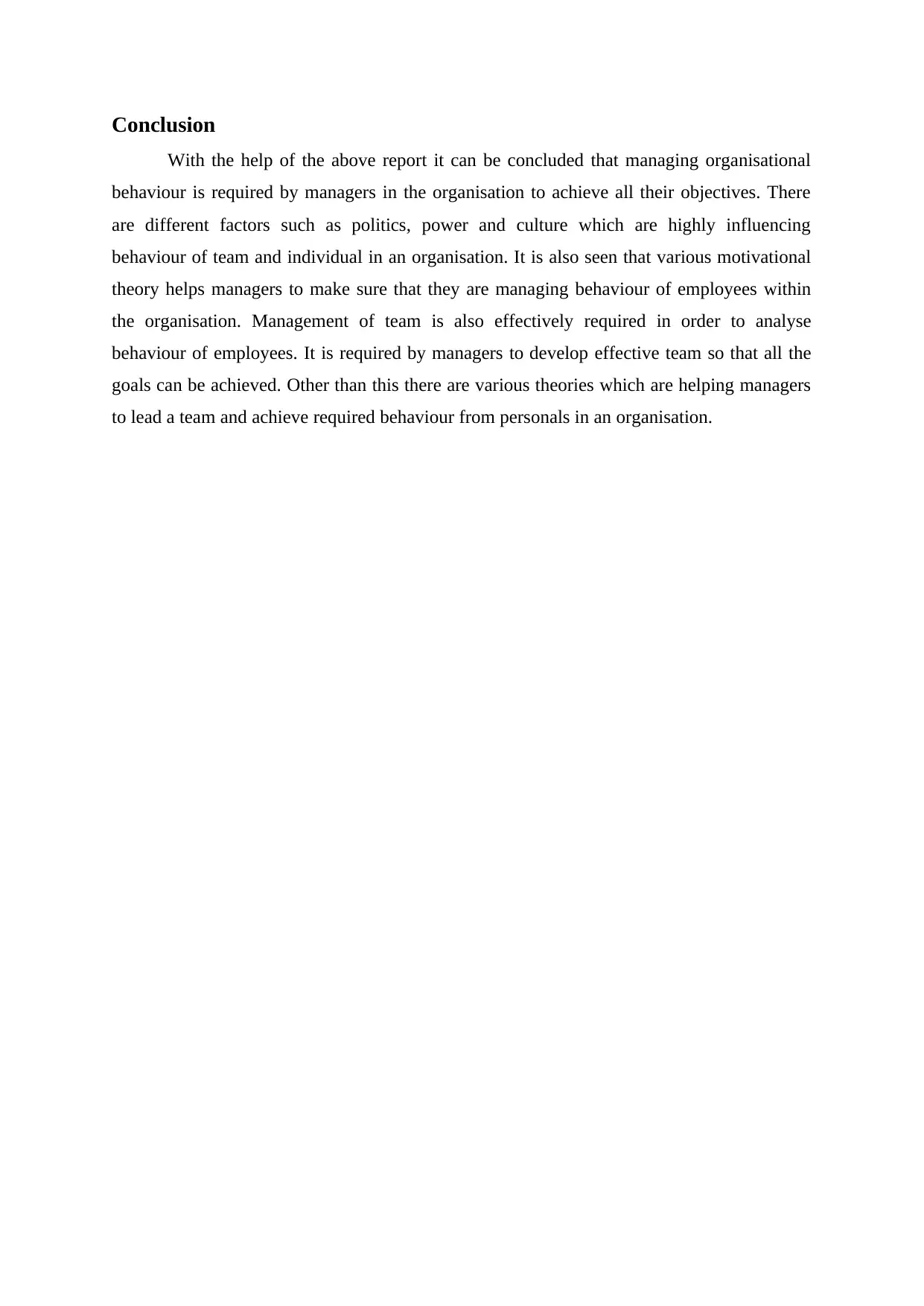
Conclusion
With the help of the above report it can be concluded that managing organisational
behaviour is required by managers in the organisation to achieve all their objectives. There
are different factors such as politics, power and culture which are highly influencing
behaviour of team and individual in an organisation. It is also seen that various motivational
theory helps managers to make sure that they are managing behaviour of employees within
the organisation. Management of team is also effectively required in order to analyse
behaviour of employees. It is required by managers to develop effective team so that all the
goals can be achieved. Other than this there are various theories which are helping managers
to lead a team and achieve required behaviour from personals in an organisation.
With the help of the above report it can be concluded that managing organisational
behaviour is required by managers in the organisation to achieve all their objectives. There
are different factors such as politics, power and culture which are highly influencing
behaviour of team and individual in an organisation. It is also seen that various motivational
theory helps managers to make sure that they are managing behaviour of employees within
the organisation. Management of team is also effectively required in order to analyse
behaviour of employees. It is required by managers to develop effective team so that all the
goals can be achieved. Other than this there are various theories which are helping managers
to lead a team and achieve required behaviour from personals in an organisation.
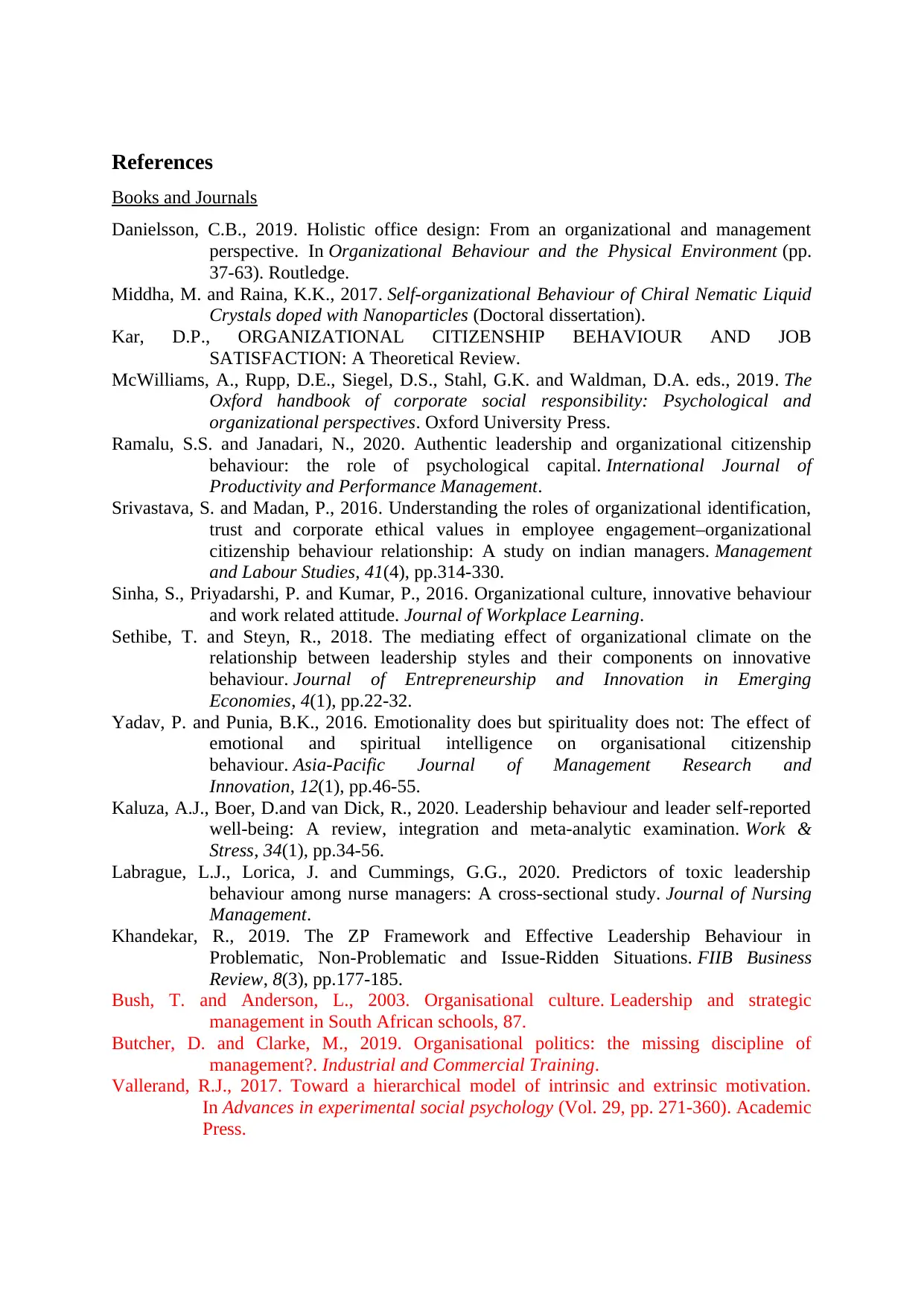
References
Books and Journals
Danielsson, C.B., 2019. Holistic office design: From an organizational and management
perspective. In Organizational Behaviour and the Physical Environment (pp.
37-63). Routledge.
Middha, M. and Raina, K.K., 2017. Self-organizational Behaviour of Chiral Nematic Liquid
Crystals doped with Nanoparticles (Doctoral dissertation).
Kar, D.P., ORGANIZATIONAL CITIZENSHIP BEHAVIOUR AND JOB
SATISFACTION: A Theoretical Review.
McWilliams, A., Rupp, D.E., Siegel, D.S., Stahl, G.K. and Waldman, D.A. eds., 2019. The
Oxford handbook of corporate social responsibility: Psychological and
organizational perspectives. Oxford University Press.
Ramalu, S.S. and Janadari, N., 2020. Authentic leadership and organizational citizenship
behaviour: the role of psychological capital. International Journal of
Productivity and Performance Management.
Srivastava, S. and Madan, P., 2016. Understanding the roles of organizational identification,
trust and corporate ethical values in employee engagement–organizational
citizenship behaviour relationship: A study on indian managers. Management
and Labour Studies, 41(4), pp.314-330.
Sinha, S., Priyadarshi, P. and Kumar, P., 2016. Organizational culture, innovative behaviour
and work related attitude. Journal of Workplace Learning.
Sethibe, T. and Steyn, R., 2018. The mediating effect of organizational climate on the
relationship between leadership styles and their components on innovative
behaviour. Journal of Entrepreneurship and Innovation in Emerging
Economies, 4(1), pp.22-32.
Yadav, P. and Punia, B.K., 2016. Emotionality does but spirituality does not: The effect of
emotional and spiritual intelligence on organisational citizenship
behaviour. Asia-Pacific Journal of Management Research and
Innovation, 12(1), pp.46-55.
Kaluza, A.J., Boer, D.and van Dick, R., 2020. Leadership behaviour and leader self-reported
well-being: A review, integration and meta-analytic examination. Work &
Stress, 34(1), pp.34-56.
Labrague, L.J., Lorica, J. and Cummings, G.G., 2020. Predictors of toxic leadership
behaviour among nurse managers: A cross‐sectional study. Journal of Nursing
Management.
Khandekar, R., 2019. The ZP Framework and Effective Leadership Behaviour in
Problematic, Non-Problematic and Issue-Ridden Situations. FIIB Business
Review, 8(3), pp.177-185.
Bush, T. and Anderson, L., 2003. Organisational culture. Leadership and strategic
management in South African schools, 87.
Butcher, D. and Clarke, M., 2019. Organisational politics: the missing discipline of
management?. Industrial and Commercial Training.
Vallerand, R.J., 2017. Toward a hierarchical model of intrinsic and extrinsic motivation.
In Advances in experimental social psychology (Vol. 29, pp. 271-360). Academic
Press.
Books and Journals
Danielsson, C.B., 2019. Holistic office design: From an organizational and management
perspective. In Organizational Behaviour and the Physical Environment (pp.
37-63). Routledge.
Middha, M. and Raina, K.K., 2017. Self-organizational Behaviour of Chiral Nematic Liquid
Crystals doped with Nanoparticles (Doctoral dissertation).
Kar, D.P., ORGANIZATIONAL CITIZENSHIP BEHAVIOUR AND JOB
SATISFACTION: A Theoretical Review.
McWilliams, A., Rupp, D.E., Siegel, D.S., Stahl, G.K. and Waldman, D.A. eds., 2019. The
Oxford handbook of corporate social responsibility: Psychological and
organizational perspectives. Oxford University Press.
Ramalu, S.S. and Janadari, N., 2020. Authentic leadership and organizational citizenship
behaviour: the role of psychological capital. International Journal of
Productivity and Performance Management.
Srivastava, S. and Madan, P., 2016. Understanding the roles of organizational identification,
trust and corporate ethical values in employee engagement–organizational
citizenship behaviour relationship: A study on indian managers. Management
and Labour Studies, 41(4), pp.314-330.
Sinha, S., Priyadarshi, P. and Kumar, P., 2016. Organizational culture, innovative behaviour
and work related attitude. Journal of Workplace Learning.
Sethibe, T. and Steyn, R., 2018. The mediating effect of organizational climate on the
relationship between leadership styles and their components on innovative
behaviour. Journal of Entrepreneurship and Innovation in Emerging
Economies, 4(1), pp.22-32.
Yadav, P. and Punia, B.K., 2016. Emotionality does but spirituality does not: The effect of
emotional and spiritual intelligence on organisational citizenship
behaviour. Asia-Pacific Journal of Management Research and
Innovation, 12(1), pp.46-55.
Kaluza, A.J., Boer, D.and van Dick, R., 2020. Leadership behaviour and leader self-reported
well-being: A review, integration and meta-analytic examination. Work &
Stress, 34(1), pp.34-56.
Labrague, L.J., Lorica, J. and Cummings, G.G., 2020. Predictors of toxic leadership
behaviour among nurse managers: A cross‐sectional study. Journal of Nursing
Management.
Khandekar, R., 2019. The ZP Framework and Effective Leadership Behaviour in
Problematic, Non-Problematic and Issue-Ridden Situations. FIIB Business
Review, 8(3), pp.177-185.
Bush, T. and Anderson, L., 2003. Organisational culture. Leadership and strategic
management in South African schools, 87.
Butcher, D. and Clarke, M., 2019. Organisational politics: the missing discipline of
management?. Industrial and Commercial Training.
Vallerand, R.J., 2017. Toward a hierarchical model of intrinsic and extrinsic motivation.
In Advances in experimental social psychology (Vol. 29, pp. 271-360). Academic
Press.
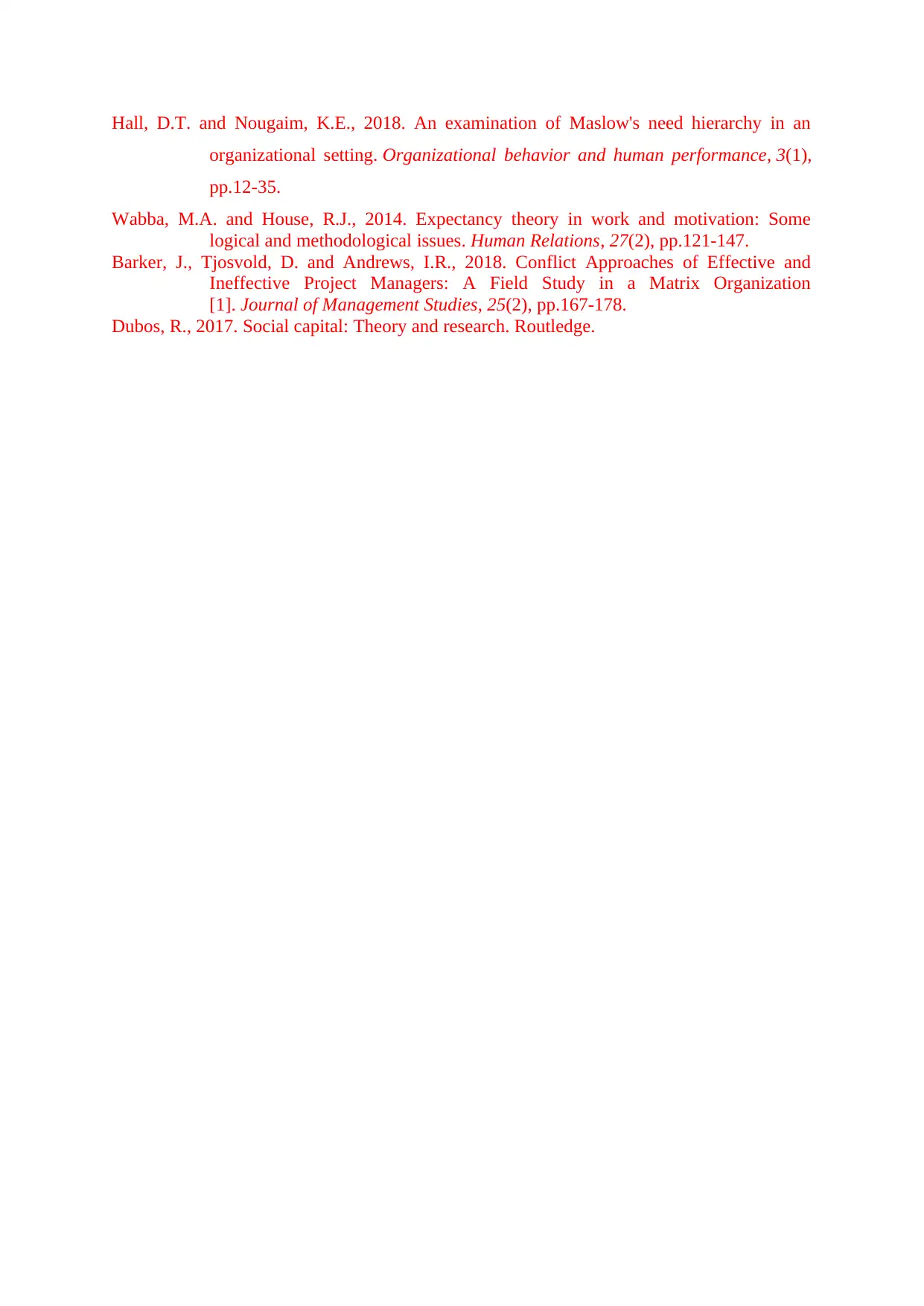
Hall, D.T. and Nougaim, K.E., 2018. An examination of Maslow's need hierarchy in an
organizational setting. Organizational behavior and human performance, 3(1),
pp.12-35.
Wabba, M.A. and House, R.J., 2014. Expectancy theory in work and motivation: Some
logical and methodological issues. Human Relations, 27(2), pp.121-147.
Barker, J., Tjosvold, D. and Andrews, I.R., 2018. Conflict Approaches of Effective and
Ineffective Project Managers: A Field Study in a Matrix Organization
[1]. Journal of Management Studies, 25(2), pp.167-178.
Dubos, R., 2017. Social capital: Theory and research. Routledge.
organizational setting. Organizational behavior and human performance, 3(1),
pp.12-35.
Wabba, M.A. and House, R.J., 2014. Expectancy theory in work and motivation: Some
logical and methodological issues. Human Relations, 27(2), pp.121-147.
Barker, J., Tjosvold, D. and Andrews, I.R., 2018. Conflict Approaches of Effective and
Ineffective Project Managers: A Field Study in a Matrix Organization
[1]. Journal of Management Studies, 25(2), pp.167-178.
Dubos, R., 2017. Social capital: Theory and research. Routledge.
1 out of 16
Related Documents
Your All-in-One AI-Powered Toolkit for Academic Success.
+13062052269
info@desklib.com
Available 24*7 on WhatsApp / Email
![[object Object]](/_next/static/media/star-bottom.7253800d.svg)
Unlock your academic potential
© 2024 | Zucol Services PVT LTD | All rights reserved.





